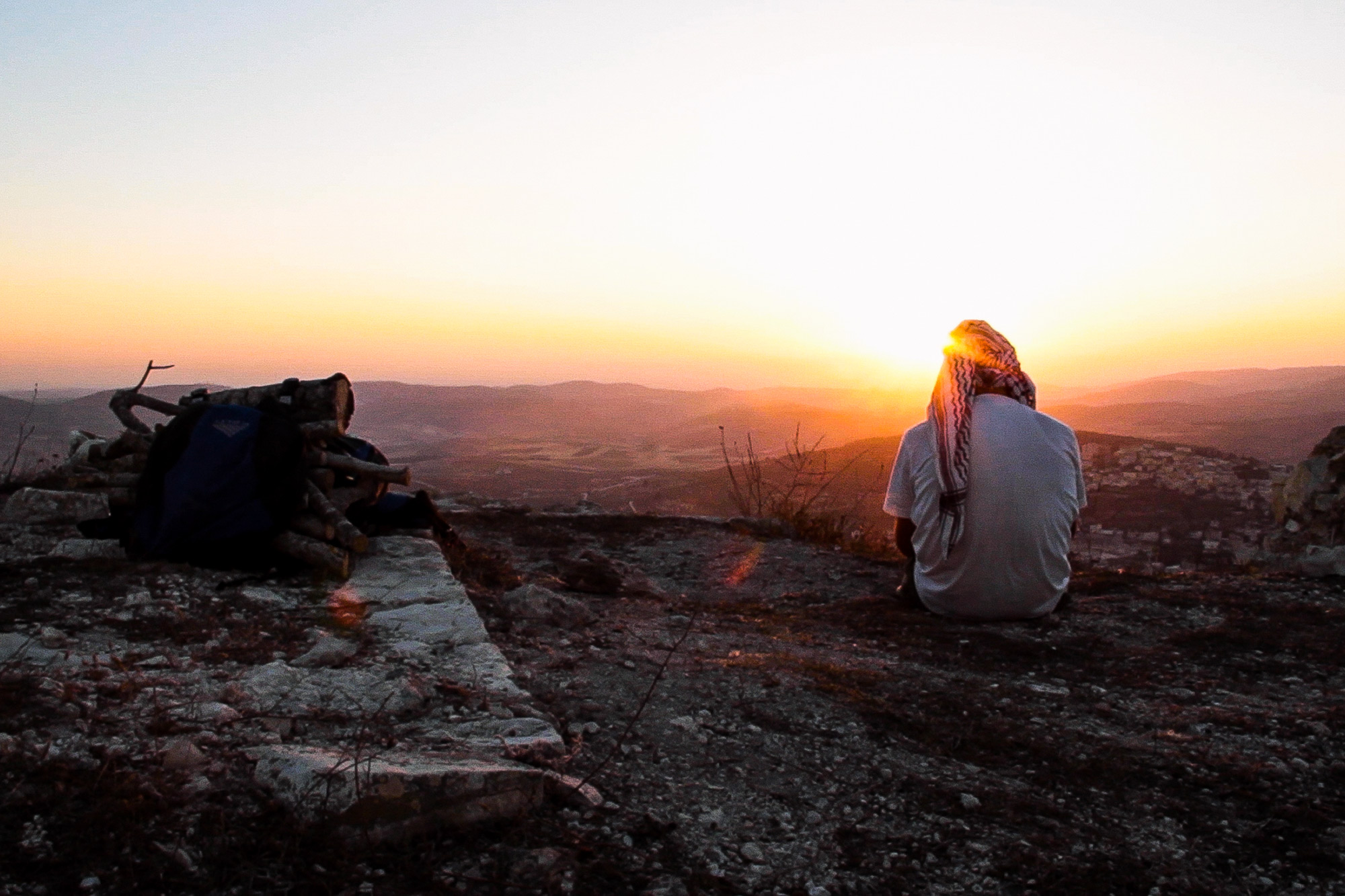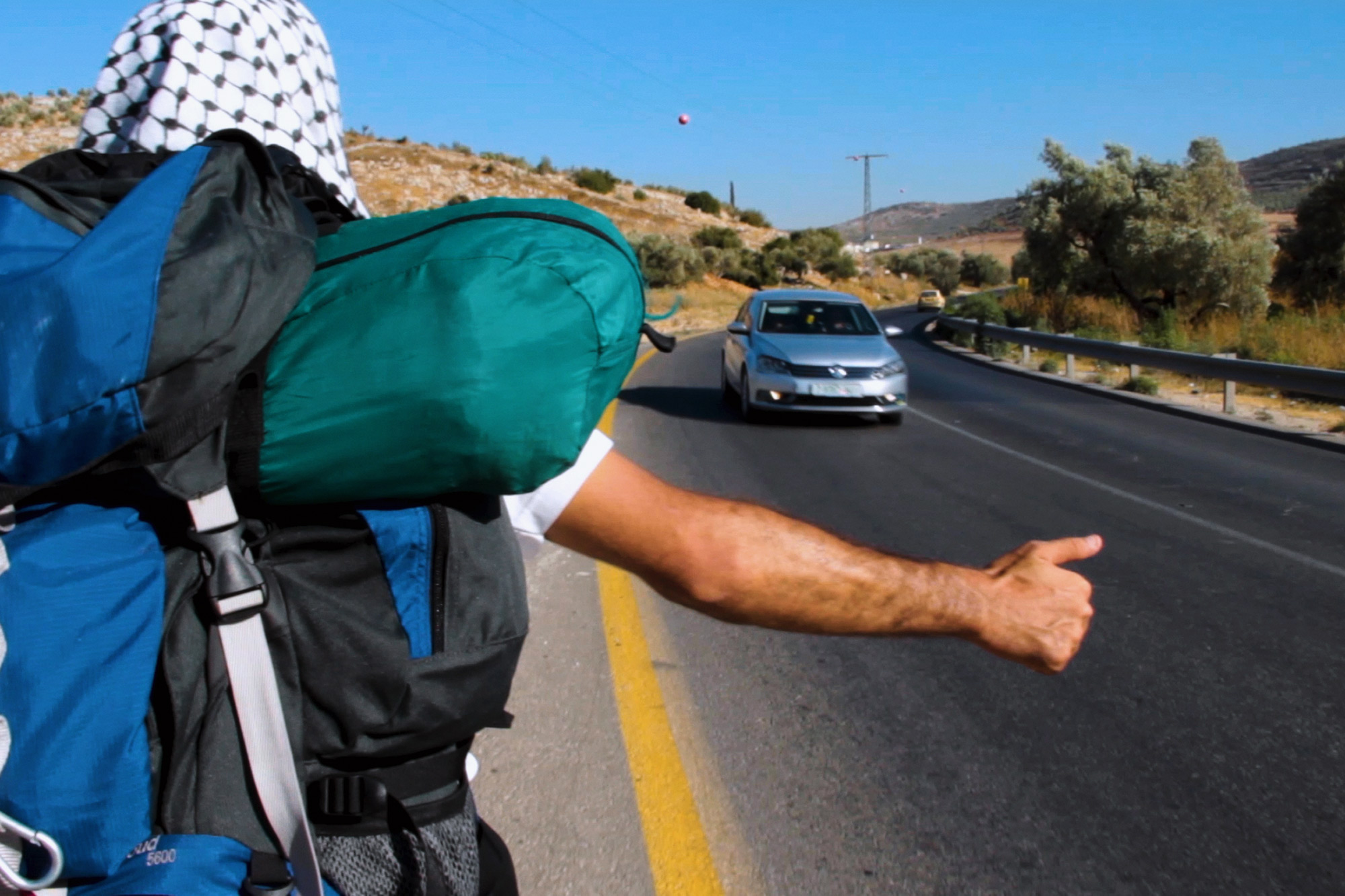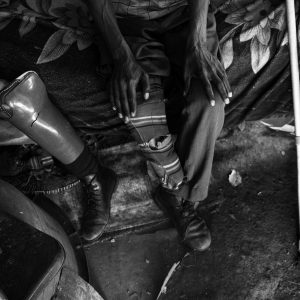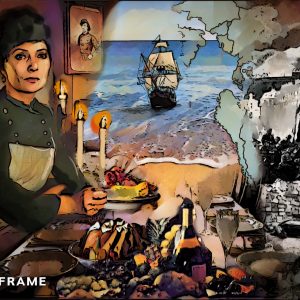‘Walled Citizen’, diary of a Palestinian backpacker
In his new film, Palestinian filmmaker Sameer Qumsiyeh documents his three-year journey exploring freedom of movement in a global system of inequality and borders.
Author:
3 February 2021

A Palestinian backpacker is a rare sight. The Palestinian passport is one of the weakest in the world, making it impossible for Palestinians to frolic from country to country like their more privileged counterparts wielding more powerful passports. But Sameer Qumsiyeh, a 32-year-old filmmaker from the occupied West Bank city of Bethlehem, decided to challenge these movement restrictions, and point to this echoed experience throughout the Global South through art.
He spent three years documenting his travels to Europe, the Canary Islands, Ecuador and within his home in the West Bank. The result is Walled Citizen, which premiered at the Galway Film Fleadh in Ireland last year and has since been shown at several international film festivals in Europe and the United States.
The film guides us through a complex and humanistic exploration of what freedom of movement means in a global system in which the piece of geographical land one happens to be born on determines our right of movement.
Qumsiyeh developed the loose concept for the film after experiencing how differently he was treated compared with his European friends. “This was like a wound in my heart that I couldn’t get rid of. Why are my European friends treated like human beings? Authorities see them as backpackers and adventurers,” says Qumsiyeh. “But for Palestinians, when we travel we are not welcomed. But I know I am no different than my European friends, so why am I treated so differently?”

“People believe that we [Palestinians] are all scary men with beards, or whatever other stereotype the media has painted for them. Any time we go to apply for a visa, that’s the attitude the authorities give us. It feels dehumanising because you feel like you’re guilty until you can prove that you’re innocent. But we also just want to travel and experience adventure like everyone else.”
He was deeply saddened by international friends who would come and go from his life in Palestine. “People come and we get attached to them, and then they leave. But why can’t I leave like them? I felt like a station in their ongoing adventure. They come and go, but we have to stay here. That really hurt me,” he says. “I felt depressed so I decided to make a movie … about why I feel this pain and these restrictions on my movement.”
In the unscripted film, Qumsiyeh takes the viewer on his adventure, winding through the discoveries, epiphanies, heartbreak and beauty he experienced in real time.

‘A world full of walls’
“I was always watching adventure and travel movies and reading books like On the Road and other typical backpacking literature. I met a lot of international people who were backpackers and this inspired me,” Qumsiyeh explains. “So I got very into this idea of backpacking and being on the road.”
But as he narrates in the film, being a Palestinian backpacker is a nearly impossible venture. “Every time I want to travel with a Palestinian passport, I am the ‘visa required’ type … which means I cannot just pack my bag and leave. This humiliating process requires me to plan months in advance. I must provide proof of reservations, of having sufficient funds in my bank account, invitation letters, proof of non-convictions, and the list goes on and on.” This aspect of the experience is a deeply familiar one for many in the Global South – including travellers from Africa – and has served to entrench and deepen devastating inequalities by denying the majority of people in the world the same opportunities to access jobs, resources, and opportunities because of the origin of their passports. Passport privilege is also tied to a long history of structural inequalities shaped by colonisation, which affords or denies rights to individuals depending on their placement in colonial history. A teenager with an American passport, for instance, can buy a ticket and jump on a plane the next day to land in Tanzania. Whereas an African scholar from a distinguished African university can easily be denied a visa to attend an educational conference.
“And once the application is submitted you have to wait, sometimes for weeks, sometimes for months, sometimes forever,” he continues. “To put it simply, the walls surrounding my life are not just the physical ones, it’s the papers, the requirements, the bureaucracy and the visas.”
Related article:
Qumsiyeh undertook his three-year journey, to try and be a backpacker in a “world full of walls”, on business and student visas. He edited the resulting footage into a film that resembles a travel or adventure movie, using electronic music to set the pace.
He also wanted to challenge the dehumanising ways the media depicts Palestinians, in which they are often framed as either terrorists or one-dimensional victims. “Most people know Palestine only as a political struggle,” Qumsiyeh says. “This is a different community that Palestinians are never present in. But I’m a backpacker and I have friends who are mountaineers and hikers. So why aren’t our stories being told?
“I didn’t want to make a political film,” he adds. “Palestinians films are always political. Obviously politics are part of our daily lives. But I wanted this to be an adventure movie. But the walls are always there because it’s coming from a Palestinian perspective.”

‘Bird in a cage’
Movement restrictions are part of everyday life in the occupied West Bank. Here and in the besieged Gaza Strip, Palestinians are not permitted to enter Jerusalem or Israel without an Israeli-issued military permit. Israel’s concrete wall looms over Bethlehem and Israeli military checkpoints are an everyday fixture.
Freedom of movement is a far-off dream for most Palestinians. “Because I’m holding a Palestinian document, that piece of shitty paper, I don’t have the simplest rights,” Qumsiyeh’s friend Majd says in the film. “And I think the simplest rights for any human being are to travel and to be able to be free. But we are not free at all. We’re in a big fucking box.”
Qumsiyeh soon discovers, however, that the movement restrictions Palestinians experience at home are a microcosm of the inner workings of the global system.
Related article:
His first destination in the film is Denmark, where he received a scholarship to study for four months and where experiences of his European friends were diametrically opposite to his Palestinian friends in Europe. For the former, travelling across borders is as easy as crossing the street. But the latter live in a different reality.
One of Qumsiyeh’s friends, an artist from Ramallah identified in the film only as HN, received the same scholarship as Qumsiyeh and decided to stay in Denmark and request asylum. “If you go deeper into these things, you’ll start thinking of committing suicide,” he says in the film. “If I go back, I will commit suicide … If I go back, I will say goodbye to my loved ones and then kill myself. There’s no life back home.”
A few months later, HN experienced a severe mental breakdown and was put into a psychiatric hospital.

Crossing over into Sweden, Qumsiyeh visits Rand, his old friend from Palestine who had immigrated to the country two years earlier and was waiting on her Swedish residency papers. This, Qumsiyeh says, was the most “emotionally challenging” part of his three-year exploration.
“I know Rand as someone who is outgoing and extroverted,” Qumsiyeh explains. “She’s full of life. So I was going there with this idea of her in mind and I was very happy she was there because I know it was her dream to live in Europe. But when I saw how depressed she was, it was like a slap in the face emotionally.”
Rand was living in legal limbo in Sweden, waiting on residency documents that would determine her rights in the country. It had taken a profound emotional toll on her.
“This is where you really know how the world works,” Rand says in the film. “You just realise that, okay, now I know that I’m stuck in something bigger, a bigger system. And this system doesn’t know you as a person. They don’t know me, like, I’m just a number for them.”
Related article:
Qumsiyeh can relate to his friend. “The most disturbing feeling is knowing that these people around you have more power than you by default. You are considered a lesser being in this political system solely because of where you were born. Rand couldn’t deal with this idea that these people she met and those around her automatically had more privilege than her solely because she was born Palestinian.”
This led Qumsiyeh to a powerful conclusion. “I think I can understand now,” Qumsiyeh narrates. “It’s the experience of being stuck, stuck with a stereotype, the rejection and the bureaucracy. We run away from Palestine because we feel stuck. So we come to Europe and get stuck again, but this time in a foreign place.
“Having wanderlust with a Palestinian passport is like being a bird in a cage whose only experience with flying is when he’s being shipped inside the cage to somewhere else. He will always be in the cage.”

Breaking down walls
Qumsiyeh’s film is not only about exploring the drastically different experiences and realities people have in the world depending on the passport assigned to them. It is also about how travelling – whether across borders or within your community – can challenge this system and tear down the walls that disrupt our connections with each other.
When Qumsiyeh went to Ecuador, the farthest place he is allowed entry without applying for a visa in advance, he experienced what he refers to as the most “important intellectual discovery” of his trip. He is introduced to a family in Ecuador who were forcibly displaced from their home and land by a mining company.
As the family described to Qumsiyeh the violent eviction they faced, he was taken aback by the similarities of their experiences to the historical and continued displacement of Palestinians.
Related article:
“We use particular words in Palestine, like ‘we got evacuated’ or ‘our homes were demolished’,” Qumsiyeh says. “For me, as a Palestinian, these words are associated with Palestine. How on earth was I now hearing someone saying these words to describe their experiences thousands of kilometres away? The Amazon is the farthest place from Palestine and yet I’m hearing them use these same words that we use to describe our oppression.
“I saw the exact story and background that happened to us in Palestine 70 years ago [during the mass displacement of Palestinians during the establishment of Israel] from a community that doesn’t know anything about Palestine. That’s when I had the realisation that this isn’t just about me being oppressed as a Palestinian. This really is one big system.”




